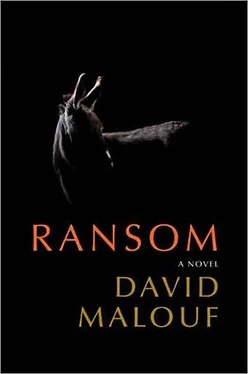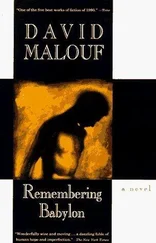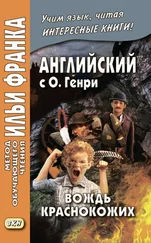Cassandra, enraptured and pure, has none of his pious trepidation. Poor child! Her brothers taunt her without mercy, seeing in this half-crazed mystic and self-proclaimed bride of Apollo a girl who has always claimed too much for herself, a practised attention-seeker — and Priam is inclined to agree, but is too fond of the child to speak openly against her. Intoxicated, overwrought, in service to a deity who takes her physically, or so she believes, in a swathe of flame, she alarms her father with the hot thoughts her god has breathed into her mouth, some of which, however terrible he finds them, he cannot wholly dismiss.
Helenus, by contrast, is Apollo’s consecrated priest. What exists quite naturally in Priam as an aspect of daily being, and in Cassandra as self-induced hysteria, has in Helenus taken a sleek professional form. Austere and commanding but entirely conventional, he is a man, Priam feels, who is too comfortable in the flesh.
Only in Priam has what is both a blessing and an awful responsibility remained close to the source. His nature is open at any moment to presences in the air around him that, when they settle out and take a bodily form, have the names of gods.
So it is now. Seated on the edge of his couch, what Priam catches out of the corner of his eye is the hem of a vanishing garment, and on the air the last breath of a message he has now to fix his mind on and recall.
He is obliged, in his role as king, to think of the king’s sacred body, this brief six feet of earth he moves and breathes in — aches and sneezes and all — as at once a body like any other and an abstract of the lands he represents, their living map.
Holding in his head all the roads that lead out to the distant parts of his kingdom, he feels them at times as ribbons tied at the centre of him, for the most part loose but sometimes stretched taut and pulling a little, according to what is occurring out there — events that his body is aware of as a dim foreboding long before the last in a relay of messengers, who for days have been running down dusty roads, bursts in to deliver it as news.
He has, two or three times during his reign, gone with a train of companions on a progress through his far-flung territories. To show himself, and to see a little of what it is out there that he represents. But his more usual role is to stand still at the centre, both actual and symbolic in the same breath, and to experience those dual states quite naturally as one.
As now, when from high up in the coffered ceiling of his chamber he catches an echo of what in other circumstances might be words.
After eleven days of watching and silent prayer, in which no food and not a drop of wine has passed his lips, a response!
His son Hector had fallen before his eyes. From a bastion at the highest point of the city walls he had looked on helpless as Achilles, working quickly, like a man under instruction from his daemon or following the contours of a dream, dragged the corpse to his car, secured it, knot after knot, to the axle-tree, and hauled it off through the tumbling dust.
Half-mad with grief he had broken from the scene and rushed down to the Scaean Gates — meaning to do what? he hardly knew. And when Pammon and Helenus caught up with him and drew him back, had sunk down in the dirt and straw of the public street, and with howls that in their pain and desolation must have seemed bearlike fouled his head with excrement, that filth his crown — his only crown now as the gods clearly intended, so that when they looked down, those high ones, they would see with no possibility of disguise what they had accomplished: this ancient doll they had set up, and for so long prized and flattered, reduced once more to what he had been when they first reached down and plucked him out, an abandoned child, all grimed and stinking; a child now with seventy years on his back, and all that lies between, the extravagant pageant of his days as Priam, King of Troy, a mockery as they had all along intended.
‘No, Priam, you are wrong.’
He starts, and when he turns and looks his eyes dazzle.
Seated close by him on the couch is the goddess Iris. She is smiling. Indulgently, he thinks. The soft light she appears in has a calming effect, and his heart opens to what she whispers in his ear.
‘Not a mockery, my friend, but the way things are . Not the way they must be, but the way they have turned out. In a world that is also subject to chance.’
‘Chance?’
He has spoken the word aloud. Again the servant stirs. Priam turns quickly to the place, afraid that if the fellow wakes and calls, the dreamlike spell that is on him may be broken.
And in fact, when he turns back, though her words continue to drop directly into his thoughts, the goddess is gone. Only the last of her shining is on the room, and he wonders — he is by nature doubtful — if even this is only an after-effect of his waking.
But where else could such a dangerous suggestion come from if not from an immortal? One of those who are free to raise blasphemous questions, because in being just that, immortal, they will never be subject to what might follow from the answer.
Chance?
Bewildered, but also strangely excited, he sets his feet to the pavement and feels about for his slippers.
His mind is as clear now as if he had slept for the whole of these eleven days and nights and woken entirely restored, his spirits quickened and lightly expanding in him.
He sits very still, his shoulders in the spare frame a little sunken; and the picture that forms before him is of himself seated just as he is here, but in full sunlight on the crossbench of a cart. A plain wooden cart, of the kind that workmen use for carrying firewood or hay, and drawn by two coal-black mules.
He himself is dressed in a plain white robe without ornament. No jewelled amulet at his breast. No golden armbands or any other form of royal insignia.
On the bench beside him the driver of the cart is a man, not so old as himself but not young either. A bull-shouldered fellow he has never seen before, in an ungirdled robe of homespun. A bearded, shaggy-headed fellow, rough but not fearsome.
Behind them, the bed of the wagon is covered with a wicker canopy, and something there is shining out from under a plain white cover. Gold or bronze it must be. It is pouring out light.
But he knows what it is — no need to lift a corner of the cloth and look beneath.
Quickly he rises, and passing the servant, who this time does not stir, swings open the door to his chamber and begins down the corridor. ‘Hecuba,’ he mutters. His blood is racing. This good news is for Hecuba, though he fears already — his doubting nature again — what her response will be when she hears his plan.
Outside, the corridor is dark, save for braziers set at easy arm’s reach along the wall and extending at intervals to the distant portal. The effect is of a black flood that has risen above head height, thick, solemn, lapping at the flickering redness of the upper walls, so that stepping out into it, what he feels is an unaccustomed lack of ease — he for whose convenience everything here is arranged by the conscientious forethought of stewards and the labour of a hundred slaves.
Here and there, as he passes, the faces of servants who sit backs to the wall, at this or that chamber entrance, loom up in the dark. Startled to see him at this hour and unattended, they stir and mutter the usual courtesies, but he is gone before they can stumble to their feet.
Yes, yes, he thinks, all this I know is unprecedented.
But so is his plan. This plunging at near dawn down a deserted corridor is just the beginning. He will get used to the unaccustomed. It is what he is after.
He feels bold now, defiant. Sure of his decision.
Читать дальше












